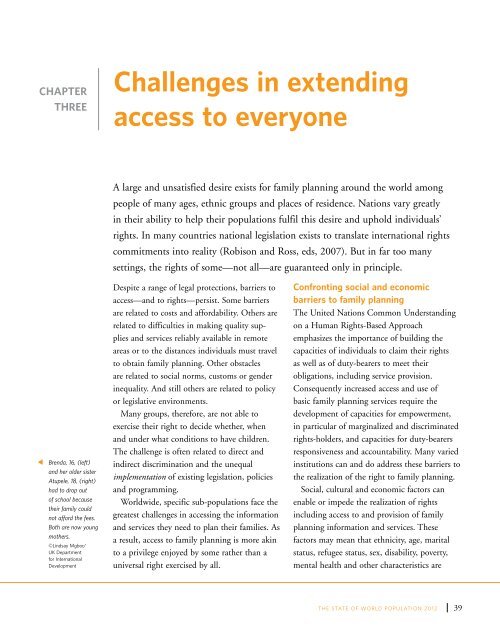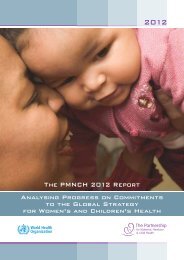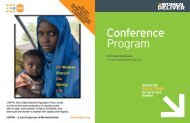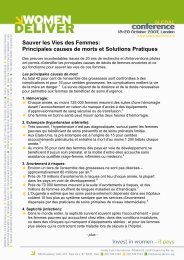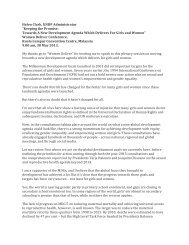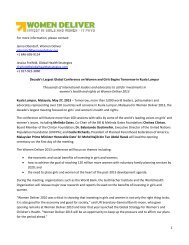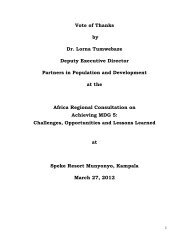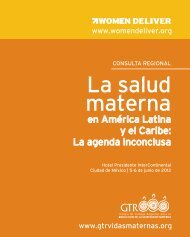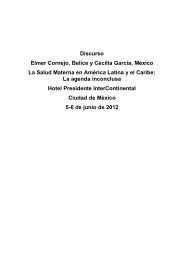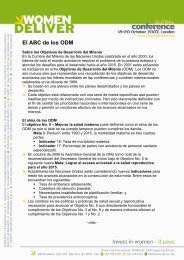State of World Population 2012 - UNFPA Haiti
State of World Population 2012 - UNFPA Haiti
State of World Population 2012 - UNFPA Haiti
You also want an ePaper? Increase the reach of your titles
YUMPU automatically turns print PDFs into web optimized ePapers that Google loves.
CHAPTERTHREEChallenges in extendingaccess to everyoneA large and unsatisfied desire exists for family planning around the world amongpeople <strong>of</strong> many ages, ethnic groups and places <strong>of</strong> residence. Nations vary greatlyin their ability to help their populations fulfil this desire and uphold individuals’rights. In many countries national legislation exists to translate international rightscommitments into reality (Robison and Ross, eds, 2007). But in far too manysettings, the rights <strong>of</strong> some—not all—are guaranteed only in principle.tBrenda, 16, (left)and her older sisterAtupele, 18, (right)had to drop out<strong>of</strong> school becausetheir family couldnot afford the fees.Both are now youngmothers.©Lindsay Mgbor/UK Departmentfor InternationalDevelopmentDespite a range <strong>of</strong> legal protections, barriers toaccess—and to rights—persist. Some barriersare related to costs and affordability. Others arerelated to difficulties in making quality suppliesand services reliably available in remoteareas or to the distances individuals must travelto obtain family planning. Other obstaclesare related to social norms, customs or genderinequality. And still others are related to policyor legislative environments.Many groups, therefore, are not able toexercise their right to decide whether, whenand under what conditions to have children.The challenge is <strong>of</strong>ten related to direct andindirect discrimination and the unequalimplementation <strong>of</strong> existing legislation, policiesand programming.<strong>World</strong>wide, specific sub-populations face thegreatest challenges in accessing the informationand services they need to plan their families. Asa result, access to family planning is more akinto a privilege enjoyed by some rather than auniversal right exercised by all.Confronting social and economicbarriers to family planningThe United Nations Common Understandingon a Human Rights-Based Approachemphasizes the importance <strong>of</strong> building thecapacities <strong>of</strong> individuals to claim their rightsas well as <strong>of</strong> duty-bearers to meet theirobligations, including service provision.Consequently increased access and use <strong>of</strong>basic family planning services require thedevelopment <strong>of</strong> capacities for empowerment,in particular <strong>of</strong> marginalized and discriminatedrights-holders, and capacities for duty-bearersresponsiveness and accountability. Many variedinstitutions can and do address these barriers tothe realization <strong>of</strong> the right to family planning.Social, cultural and economic factors canenable or impede the realization <strong>of</strong> rightsincluding access to and provision <strong>of</strong> familyplanning information and services. Thesefactors may mean that ethnicity, age, maritalstatus, refugee status, sex, disability, poverty,mental health and other characteristics areTHE STATE OF WORLD POPULATION <strong>2012</strong>39


